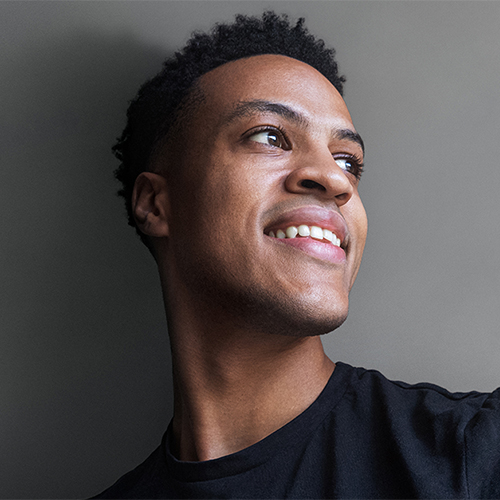Please update your browser.

Biko JJ Agozino
Automated Trading Associate
Biko JJ Agozino never thought he'd end up working in financial services. When he began his graduate studies in computer science, he assumed he'd follow his passion for hip hop into the industry—in fact, he wrote his dissertation on computer-generated drum rhythms. As graduation neared, he was on track to reach his goal: He was offered a job at a music start-up, and he was prepared to take it.
But then life took a left turn.
Intrigued by the computational challenges that face large corporations operating in real time, he opted for a completely different career path: a job working in automated trading strategies at J.P. Morgan in London.
What does success look like to you?
For me, success is not about a destination. For me, it's really the journey, the whole picture of where you've come from, the ups and downs and turbulence along the way. It's everything you've navigated to get where you are now.
Who has been the biggest influence in your life?
My dad. Definitely. He is from Nigeria and was the first generation in his family to graduate primary school, which he did in an area recovering from the civil war that occurred in the 1960s-1970s. Then he did his bachelor's degree in Nigeria and received a scholarship to do a masters at Cambridge. He was one of two Africans to get a scholarship to Cambridge that year. He went on to get a PhD and is now a professor in America.
My dad is very outspoken, which is something I really admire about him. He instilled in me the value of education and I went to his alma mater – Cambridge – for my bachelor's, which I never would have done without him as my inspiration.
What do you consider the most valuable piece of advice you've ever received and where did it come from?
When I was about to move into my current group at J.P. Morgan, I asked my managing director what I could do to ensure that I excelled on his team. He said, “Honestly, you can't try to emulate anyone else on the team. You need to find your own strengths and your own niche and make yourself invaluable to your manager." That's what I've done. I'm not the world's best currency trader. But I am a relatively good software engineer!
What is the biggest obstacle you've overcome in life?
My parents divorced when I was two and my father moved over to America, so for the most part I grew up in London with a single mom. I went to a very rough secondary school where only one in three students got the minimum passing grades. The minimum. There was a lot of gang and drug violence around.
My mom still lives in that neighborhood. It was significant to be able to come from that environment and be able to go to a very good university to study computer science.
Work-from-home, go to the office or a mix of both?
Definitely go to the office. I would maybe like to have the option of working from home every one in twenty days. But I find the silence of working from home really distracting. I like the background noise of being in the office. I feel much more productive in that environment. And I like the work/life separation of the office.
Do you want to talk about anything happening these days around the world?
I want to talk about the Black Lives Matter movement in America because it is highly relevant to the UK.
Black people are 2 – 3 percent of the population of the UK, just a drop in the ocean in a country this large. But if you ask any of us here in the UK, we are hurting, too. I was actually in the majority at my secondary school because there were only about five white English people in my year, but in Cambridge I was heavily in the minority. Now at J.P. Morgan, I am somewhere in between.
We need to recognize that it's a complete global struggle against racism, and our allies need to recognize that it's not just black Americans who are hurting. I went to a Black Lives Matter protest in London. We started at the US Embassy and marched all the way to Buckingham Palace. We marched because there are cases in the UK and in London that we are fighting for, that we want the British government to address. We also marched in unison and outrage over George Floyd.
My colleagues at J.P. Morgan—both those who I work closely with on a daily basis and our senior leadership—have been very supportive and are treating the situation with the gravity it deserves. One thing that leaves me feeling optimistic about the future is that people of all races are involved in the movement and are advocating for the necessary reforms to be made.